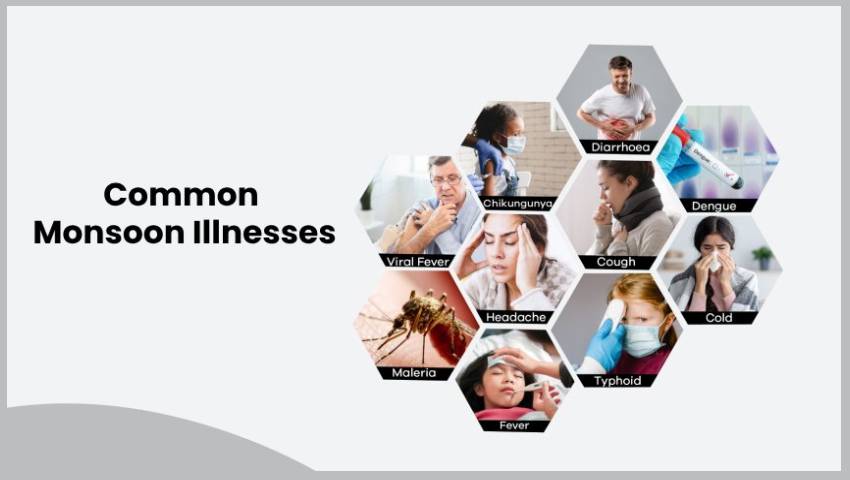
- 13/06/2025
- Mulshi Speciality Hospital
- 0 Comments
- Blogs
Common Monsoon Illnesses and How to Prevent Them?
The monsoon season brings a refreshing change in weather, cool breeze, and lush greenery. But along with the joy of rain, it also brings a rise in Common Monsoon Illnesses, infections, and seasonal diseases. From viral fevers and stomach infections to mosquito-borne diseases like dengue and malaria, this season can take a toll on your health if proper care is not taken.At Mulshi Speciality Hospital, Pirangut, the first NABH-accredited multispeciality hospital in the Mulshi region, doctors are seeing a seasonal rise in cases related to Common Monsoon Illnesses. In this blog, we will explore some of the most common monsoon-related diseases and, more importantly, how you can protect yourself and your family.Whether you’re a local resident, a student living in Lavale or nearby, or visiting the Mulshi area, staying informed and aware during the rainy season is crucial. Read on to learn more from the expert team at Mulshi Speciality Hospital – the best hospital in Mulshi and Pirangut.
Why Do Illnesses Increase During the Monsoon?
The rainy season creates a perfect environment for bacteria, viruses, and mosquitoes to thrive. The combination of water stagnation, humidity, and temperature fluctuation leads to a spike in infections, especially in areas with poor drainage or hygiene. Many people, especially children, elderly, & those with weak immunity, are more prone to fall sick during this time. Hence, early awareness and timely precautions are the key to staying healthy.
Common Monsoon Illnesses in Pirangut and Mulshi Region:
- Cold, Cough, and Viral Fever:
- Symptoms: Sore throat, running nose, fever, body ache.
- Cause: Sudden temperature changes and getting drenched in rain.
- Prevention: Avoid getting wet, maintain hygiene, and boost immunity with healthy food and adequate rest.
- Dengue and Malaria:
- Symptoms: High fever, chills, body pain, rashes (for dengue).
- Cause: Mosquito bites due to stagnant water.
- Prevention: Use mosquito repellents, wear full-sleeved clothes, and don’t allow water to collect around your house.
- Typhoid:
- Symptoms: Weakness, fever, abdominal pain, constipation or diarrhea.
- Cause: Contaminated food or water.
- Prevention: Drink boiled or filtered water. Eat freshly cooked food and avoid roadside stalls.
- Gastroenteritis and Food Poisoning:
- Symptoms: Vomiting, diarrhea, stomach cramps.
- Cause: Eating unhygienic food or drinking unclean water.
- Prevention: Wash hands before meals. Eat only home-cooked meals and avoid eating outside during the rainy season.
- Leptospirosis:
- Symptoms: Headache, muscle pain, fever, redness in eyes.
- Cause: Coming in contact with contaminated water or mud.
- Prevention: Avoid walking in floodwater or puddles barefoot. Use protective footwear.
- Skin Infections and Fungal Issues:
- Symptoms: Itching, redness, rashes, or peeling of skin.
- Cause: Excess moisture and damp clothes.
- Prevention: Keep your skin dry, wear breathable clothes, and change damp clothes immediately.
How to Prevent Monsoon Illnesses – Tips from Mulshi Speciality Hospital Doctors?
The expert team at Mulshi Speciality Hospital, Pirangut, shares these simple but effective prevention tips to stay healthy this monsoon:
- Maintain Personal Hygiene:
- Take a shower if you get drenched.
- Keep nails trimmed and clean.
- Wash hands frequently with soap.
- Drink Safe Water:
- Always consume boiled or filtered water.
- Avoid drinking tap water, especially in rural and hilly areas.
- Eat Clean and Cooked Food:
- Eat fresh, home-cooked food.
- Avoid leafy vegetables and street food which may be washed in dirty water.
- Include immunity-boosting items like ginger, turmeric, and tulsi in your diet.
- Keep Your Home Mosquito-Free:
- Don’t let water collect in buckets, pots, or AC trays.
- Use mosquito nets and repellents regularly.
- Clean your surroundings to reduce breeding spots.
- Use Weather-Appropriate Clothing:
- Wear cotton clothes that dry quickly.
- Keep an umbrella or raincoat handy to avoid getting wet.
- Avoid Self-Medication:
- If you feel unwell, don’t ignore symptoms or try home remedies without medical advice.
- Visit a qualified doctor early for diagnosis and treatment.
At Mulshi Speciality Hospital in Pirangut, timely consultation and accurate diagnosis are just a call away. The hospital is well-equipped with modern diagnostics and experienced doctors to handle seasonal health problems efficiently.
When Should You Visit a Doctor?
Seek medical attention if you notice the following signs:
- Fever lasting more than 2 days
- Unexplained fatigue or body pain
- Vomiting or persistent diarrhea
- Skin rashes or unusual irritation
- Breathing difficulties or chest pain
You can consult specialists in general medicine, pediatrics, gynecology, and emergency care at Mulshi Speciality Hospital – the best hospital in Mulshi and Pirangut.
Why Choose Mulshi Speciality Hospital, Pirangut?
- NABH-Accredited Multispeciality Hospital
- Advanced Diagnostic Lab & In-house Pharmacy
- Experienced Doctors Across Specialties
- 24×7 Emergency & Ambulance Services
- Cashless Insurance Support & Affordable Charges
- Trusted by Families in Lavale, Mulshi, Bhugaon & Pirangut
Whether it’s a minor infection or a serious illness, trust Mulshi Speciality Hospital to provide the right care at the right time
Final Words:
Monsoon is beautiful but can be risky for your health if precautions are ignored. Stay informed, stay hygienic, and take preventive steps seriously. If you or your loved ones fall sick, don’t delay treatment. Visit Mulshi Speciality Hospital, Pirangut – the best hospital in Mulshi Pune, for expert consultation and comprehensive care during the monsoon season.
